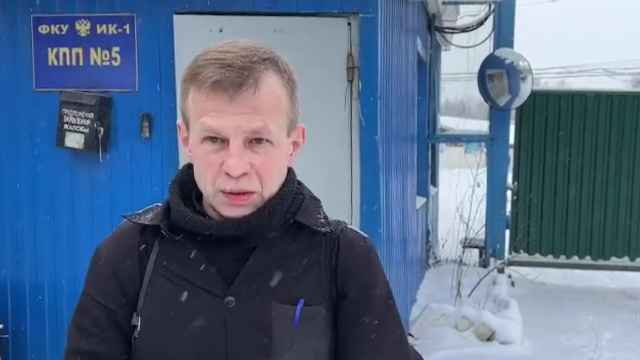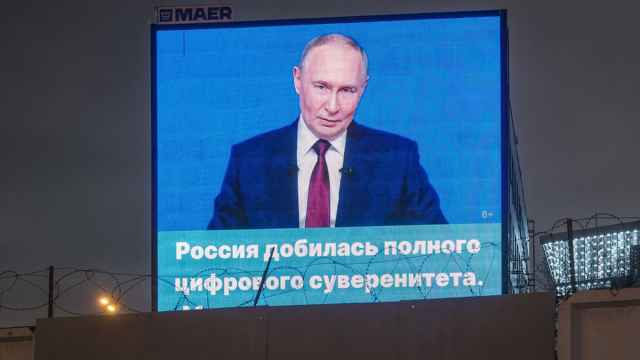While the Russian consulate in London is getting ready for deploying a biometric visa system, its headquarters in Moscow — the Foreign Ministry — denies such a plan is in the works.
“It’s only a question of time,” Jelena Kirilenko, managing director of the Russian Visa Center in London, said in an interview. “We are ready to establish a biometric system as soon as there is a necessity to do so.”
The use of biometric data would require each visa candidate to submit their application in person — adding a new layer of complication to an application system that was recently streamlined for British citizens.
The imminence of the new process was confirmed by the consular department of the Russian Embassy in London.
“The consulates of the Russian Federation’s Foreign Ministry will move to biometric visas in the near future,” said Andrei Batmanov, head of the consular section at Russia’s embassy in London. “Accordingly, in those countries where Russian visa centers are operating, the apparatus for taking biometrics will be installed.”
Batmanov said he did not know exactly when the biometric system would be introduced — or whether Britain would be the first country where it would be applied.
The Foreign Ministry in Moscow, however, denied that there were any plans to introduce a biometric requirement for visa applications.
“No biometric visas requiring the essential provision of photos or fingerprints — neither for British citizens nor citizens of another country — will be introduced in the foreseeable future, and there are no plans to introduce them,” a ministry source told The Moscow Times.
The ministry did not comment on when biometric processing equipment might be installed at passport control points in Russia.
The embassies of the United States and Britain in Moscow both told The Moscow Times that they had no specific information about biometric visas to Russia being an imminent requirement for their citizens.
“But there is a global move in this direction because it makes travel safer for everyone,” British Embassy spokesman James Barbour said.
A U.S. Embassy spokesman said: “The U.S. Embassy in Moscow has not been informed by the Russian government of any plans to implement biometric Russian visas for Americans.”
Applicants for Russian visas at the moment do not need to submit biometric details — however, every applicant for British and American visas the world over, including Russian citizens, must provide biometric data in order for their visa application to be processed.
The biometric part of the application involves a digital scan, or “enrollment,” of all 10 fingers and a digital photograph. Those who receive a visa have their fingerprints checked against their original data on entering the countries.
Effecting similar changes to the visa system for applicants wanting to obtain a Russian visa would involve substantial alterations to current procedures.
All requests for Russian visas in the United States are currently mediated through travel agencies, and applicants rarely make personal visits to Russian consulates.
Many British applicants also do not visit the Russian visa centers in Britain in person, and instead use agencies and courier services. Under a biometric system, however, a personal visit would become necessary in order to provide the fingerprint scan and digital photograph.
Ashley Sherman, although now working in London’s financial sector, used to live in Manchester, a city almost 300 kilometers from the British capital. He makes regular trips to Russia and has always used the postal option — never having visited the visa center or embassy in person.
“You would have thought Russia, a country of such vast dimensions, would have a greater awareness that not everyone lives in London and close to the visa center,” he told The Moscow Times. “A biometric system would be irritating.”
A biometric requirement implemented in Britain would add an extra layer to an application process that was significantly simplified about two years ago.
In January 2009, the visa application process for British citizens was outsourced to an India-based company, VFS Global, which manages visa services for the diplomatic missions of 34 countries.
VFS Global, a subsidiary of the Kuoni Group, is also used by the British Embassy in Russia to provide its visa services.
Two visa application centers were established in Britain: one in London and another in Edinburgh. The London center alone can process up to 1,000 applicants per day, said Kirilenko, its managing director.
Yury Fedotov, Russia’s ambassador to London until 2010, said creating the new visa centers was one of his main achievements during his five-year tour.
Previously, visa applications were processed exclusively by the consulates themselves.
Nathaniel, a graduate student at London’s School of Slavonic and Eastern European Studies and a frequent traveler to Russia, who declined to give his last name, praised the new system.
“Before they opened the visa center, I seemed to be permanently setting my alarm extra early,” he said. “[The Russian Embassy’s consular section] was only open for a few hours in the morning and queues would form from about six. Even once you were inside, the atmosphere in that blasted place was unfriendly.”
“I can’t begin to describe how much easier the new center is,” he said. “The people behind the desks are friendlier and, although I may be imagining it, more beautiful.”
The new visa center in London has a spacious, white interior with fact boxes about Russia, Lonely Planet guides for sale and a huge photograph of the Kremlin on a sunny day covering the walls behind the counters where applications are submitted. It employs 20 people.
A telephone information service was created at the same time as the new visa centers.
But the convenience of the system has not made any difference to the quantity of Russian visas issued to British citizens, which dropped from more than 115,000 in 2007 to 85,000 in 2009. Last year saw a slight increase to about 90,000.
Consular head Batmanov attributed the decline since 2007 to the economic crisis.
Kirilenko was optimistic, however, that the 2014 Winter Olympics in Sochi and the FIFA World Cup in 2018 may provide opportunities for the expansion of the Russian Visa Center in London.
“We will try and do everything in our power to ensure that they can come to Russia in time,” Batmanov said.
A Message from The Moscow Times:
Dear readers,
We are facing unprecedented challenges. Russia's Prosecutor General's Office has designated The Moscow Times as an "undesirable" organization, criminalizing our work and putting our staff at risk of prosecution. This follows our earlier unjust labeling as a "foreign agent."
These actions are direct attempts to silence independent journalism in Russia. The authorities claim our work "discredits the decisions of the Russian leadership." We see things differently: we strive to provide accurate, unbiased reporting on Russia.
We, the journalists of The Moscow Times, refuse to be silenced. But to continue our work, we need your help.
Your support, no matter how small, makes a world of difference. If you can, please support us monthly starting from just $2. It's quick to set up, and every contribution makes a significant impact.
By supporting The Moscow Times, you're defending open, independent journalism in the face of repression. Thank you for standing with us.
Remind me later.






